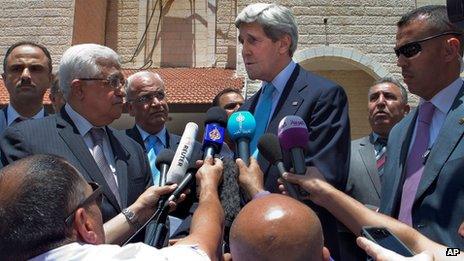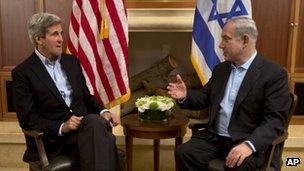Can Israeli-Palestinian talks achieve breakthrough?
- Published

US Secretary of State John Kerry will be urging the Palestinians to address Israel's security concerns
The Israeli-Palestinian peace process has long been defined by a paradox; everyone knows what must be done to end this age-old conflict but no-one seems able and willing to do it.
And it has always been said no-one "can want peace more than the parties to the conflict".
But US Secretary of State John Kerry has proven again that a third party is a necessary condition to get them to negotiate directly.
However, decades of peace-making have also shown that a persistent mediator - most often an American - is necessary, but not sufficient, to reach an historic deal.
Still, after six months of meetings and meals at Israeli, Palestinian and Arab tables, Mr Kerry has finally persuaded both sides to come to Washington to sit at an American table to talk.
His careful choice of words underlines that this first round of direct negotiations since 2010 is still just talks about talks. Senior negotiators will take their seats, not the leaders.
But there is no denying that Mr Kerry's dogged diplomacy has achieved a small important step on this rocky road to peace.
Sensitive issues
In part, the breakthrough is a face-saving device for all sides.
Mr Kerry did not want a sixth trip ending with "we're getting close".
Neither Palestinian President Mahmoud Abbas nor Israeli Prime Minister Benjamin Netanyahu wanted to be blamed for his failure.
Both sides have come to appreciate that Mr Kerry has made this his mission, despite all the odds, and has US President Barack Obama's backing.
Few details have emerged so far about this "basis for resuming direct final status negotiations".
Palestinian officials still protest that Israel has not agreed that negotiations on their future state must start with borders that approximate to the boundaries of land Israel captured in the 1967 war.
A stop to settlement building is another highly sensitive issue putting Palestinian pressure on President Abbas not to go back to the table now.

Israel will be pushed to address the issue of its settlement building
But it appears Mr Kerry was able to persuade Israel to move on another major Palestinian concern, the release of prisoners.
Israeli minister Yuval Steinitz said prisoners would be released in phases including "heavyweights who had been in prison for tens of years".
Demands on Palestinians are certain to include assurances that no unilateral steps will be taken, including a return to the United Nations in September.
A senior Palestinian negotiator recently told me, with barely concealed anger, that the "status quo" was finished if Israel did not return to substantive talks.
Speaking on the BBC's Newshour programme, Uri Savir, Israel's negotiator in secret Oslo talks 20 years ago, said he believed an American framework would provide the basis for talks.
Based on their public statements, that includes
the 1967 borders with mutually agreed land swaps
acceptance that settlement building is not "constructive"
Israel's security concerns and recognition that it is a Jewish state.
Everyone knows, roughly, what must be done. But can all sides now do it?